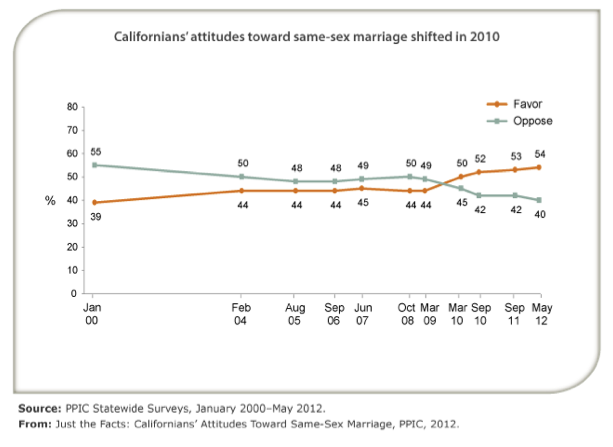Lost amid today’s Supreme Court oral arguments on California’s Proposition 8 is a simple question: How did a gay marriage ban pass in one of the most liberal states in the country just four years ago?
The answer is both fascinating and complex, and reveals just how much the Golden State (and the country) has evolved on the issue since the 2008 election.
Let’s start with the basics. Statewide, Prop. 8 was approved — the “yes” vote was in favor of eliminating same-sex marriage — 52.3 percent to 47.7 percent. That number is even more remarkable when you consider that President Obama won California with 61.1 percent of the vote on the same day. (Worth noting: Then candidate Obama opposed same-sex marriage.)
All five of California’s most populous counties — Los Angeles, Orange, Riverside, San Bernadino and San Diego — voted in favor of Prop. 8 even as Obama was carrying four of the five in the presidential race.
Los Angeles County — the state’s most populous — is particularly interesting to look at. In LA County, Prop. 8 won a narrow majority of 50.1 percent. But, President Obama carried the county with a whopping 69 percent.
The discrepancy? African American voters, who were overwhelmingly in favor of banning same sex marriage (70 percent supported Proposition 8) even as they supported Obama even more heavily (94 percent). And, to a lesser degree, Hispanic voters followed that same trend — backing Prop. 8 by a 53 percent to 47 percent margin while giving President Obama 74 percent.
The explanation? Many largely black churches supported Prop. 8 while Hispanics, a heavily Catholic community, were more naturally inclined to side with their faith — and against gay marriage.
Demographics weren’t the only reason for Prop. 8′s success, argued Rob Stutzman, a California-based Republican strategist.
“The better campaign won,” he said. “The ‘yes’ side exploited Newsom’s ‘like it or not’ arrogance and additionally zeroed in on skepticism voters had for what it could mean for children.”
(Then San Francisco mayor — and now California Lt. Governor — Gavin Newsom enraged many supporters of traditional marriage when following a federal court ruling that overturned Prop. 8 he insisted that gay marriage’s time has come “whether you like it or not.“)
Garry South, a longtime Democratic strategist in California, largely agreed with Stutzman’s analysis. “The ‘No on 8′ campaign had plenty of money ($40 million plus) — actually outspent the yes side,” said South. “But it was essentially run by a committee of community activists who didn’t trust any non-gay professionals and wouldn’t take advice from more experienced campaign strategists on the outside who know what they’re doing.”
Regardless of how Prop. 8 passed, it’s clear from a look at current polling in the state that such a measure would meet a very different fate in 2013 than it did in 2008.
Looking at Public Policy Institute of California (PPIC) polling data, it’s clear that shortly after Prop. 8 passed, sentiment about gay marriage began to change. In October 2008, 50 percent opposed gay marriage. By May 2012, 54 percent of Californians supported same-sex marriage.
Stutzman, the GOP strategist, is candid about how California has changed since 2008. “Four years later I don’t believe [Prop. 8] would pass again,” he acknowledged.
Crossposted on The Fix, Washington Post


